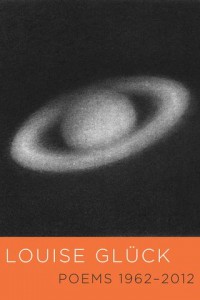2012 Staff Picks: Alexis Vergalla reviews Louise Glück’s collected works
 Poems 1962-2012
Poems 1962-2012
Louise Glück
Farrar, Straus and Giroux, 2012
By Alexis Vergalla, Poetry Northwest
I want to start with a disclaimer: I like Louise Glück’s poetry. I cannot work in a garden beside someone and not think of her lines from the poem “The Garden in The Wild Iris”: “Look at her, touching his cheek / to make a truce, her fingers / cool with spring rain; / in thin grass, bursts of purple crocus– // even here, even at the beginning of love, / her hand leaving his face makes / an image of departure”. Glück is intimate and distant; she exposes her narrator with brutal force and yet withholds. She has an impressive volume of work, and Poems 1962- 2012 contains each book—eleven in total.
I read in Glück’s essay “Education of the Poet” that she remembers, verbatim, most of what she’s written. Perhaps this is possible because much of what she writes circles around the same themes. I don’t think this is unique in an oeuvre, and I don’t see this as a failing of the poet. But like friends who begin a road trip in high spirits and return home tired of each others’ repeated stories and discovered habits, I think I like Glück best in single book servings. I’m very glad to have her entire works at my fingertips, but it was a poor idea on my part to run at it cover to cover. The themes become overbearing, full of familial sorrow, and I felt dazed and overwhelmed at the end. As an example of her repetition, I’ll cite several poems from the final book, A Village Life. “The First Snow” concludes with the lines “Because the mother’s sick to death of her life / and needs silence,” while slightly later the poem “Bats” concludes: “death / terrifies us all into silence.” On the very next page the poem “Abundance” concludes: “No sound except the roar of the wheat.” I enjoy each poem individually, but together they pile into a conclusion of silence and a hurried turning of the page.
Poems 1962 – 2012 is an important reference book, and I think diving in and out of the volume allowed poems like “Celestial Music”, from Ararat, to worm their way into my head and emerge later in a dream-state, where I spoke to angels and woke in tears. A good poem should have that power, and so many of Glück’s poems do. There are countless lines I can cite and wonderful arcs to follow within each book. I’d be curious to see what the sum total of the book would feel like if it were organized differently—alphabetically perhaps, like Dean Young’s recent selected. A jostling and new juxtaposition might have given the poems the breathing room they require. Luckily, as readers, we can create our own time and space and allow Glück’s words to glow as they so want to.
